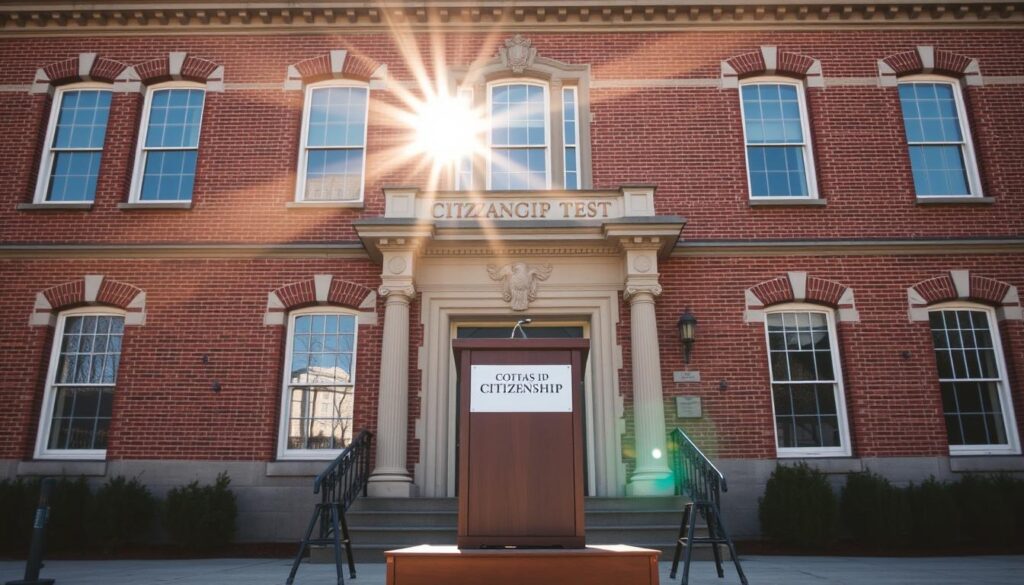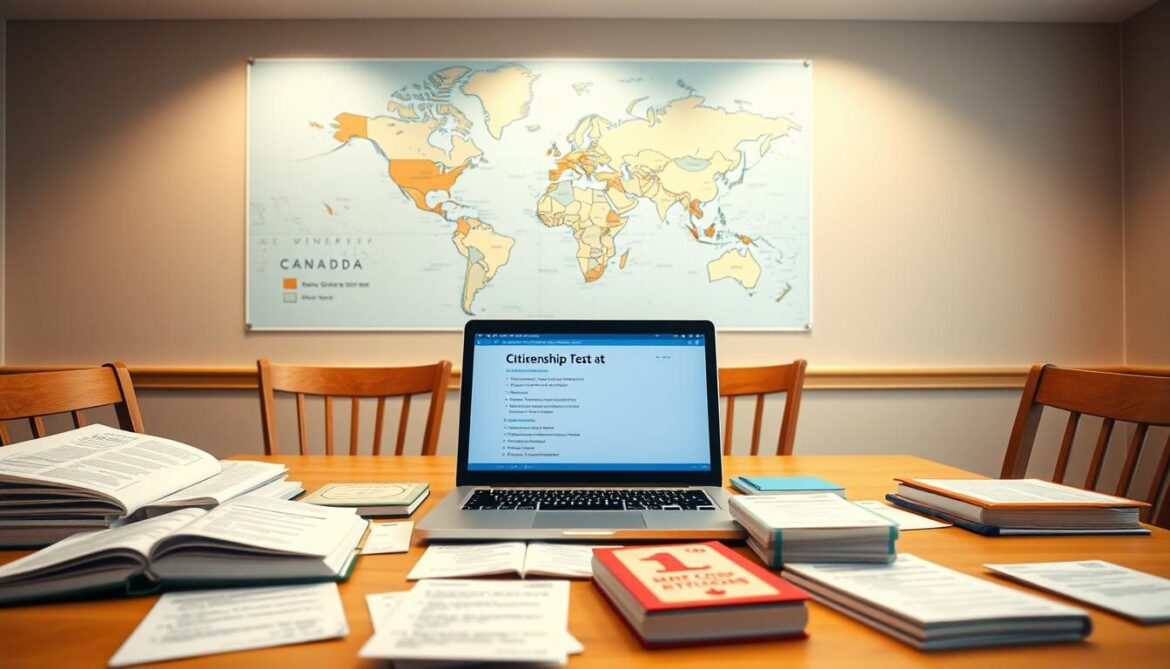Did you know over 30% of first-time applicants score below the passing mark on their initial attempt? Understanding your nation’s values, history, and governance isn’t just symbolic—it’s a requirement for becoming a Canadian citizen. This guide offers a clear path to mastering the material you’ll face in the official examination.
The official evaluation includes 20 questions covering topics like geography, laws, and national symbols. Many find the format challenging without preparation. Structured practice tools help you identify gaps in your knowledge while building familiarity with question styles.
Scoring at least 15 correct answers (75%) is mandatory to pass. Regular self-assessment sharpens recall and reduces test-day anxiety. Resources range from online quizzes to interactive study guides, all designed to mirror the real exam’s structure.
Key Takeaways
- Structured practice materials closely replicate the official exam’s content and format.
- Identifying knowledge gaps early improves your chances of achieving a passing score.
- Accessible resources cover essential topics like history, government, and national symbols.
- Consistent self-assessment builds confidence and reduces stress.
- A minimum score of 75% (15/20) is required to succeed.
Introduction to Your Canadian Citizenship Journey
Your journey to joining the Canadian community starts with meeting key requirements and proving your knowledge. Permanent residents aged 18–54 must complete an evaluation as part of their application. This step ensures you understand national values, rights, and responsibilities.
You’ll choose between English or French for your assessment—a flexibility that respects linguistic diversity. The process typically spans 12–18 months, with these milestones:
| Stage | Duration | Key Requirement |
|---|---|---|
| Application Review | 3–6 months | Document verification |
| Knowledge Assessment | 2–4 weeks notice | 20-question evaluation |
| Ceremony Preparation | 1–3 months post-approval | Oath confirmation |
Structured preparation tools help navigate historical timelines and governance structures. Many use free online resources to build confidence before their assessment date. Remember: demonstrating commitment to civic participation strengthens your application.
The final step—the citizenship ceremony—symbolizes full integration into society. Successful applicants report feeling empowered by understanding regional traditions and legal frameworks during their journey.
Understanding the Test Structure and Requirements
Grasping the framework of the evaluation is crucial for success. The assessment combines factual knowledge with practical understanding of national principles. Let’s break down what you’ll encounter.
Test Format, Scoring, and Subject Areas
You’ll face 20 questions in multiple-choice or true/false formats. Allocate 45 minutes carefully—most find this sufficient for thoughtful responses. A passing score of 15 correct answers (75%) demonstrates mastery of core concepts.

- Historical milestones and cultural evolution
- Physical and political geography
- Governmental systems and electoral processes
- Legal frameworks and civil liberties
- Economic foundations and trade relationships
Eligibility and Key Components
Your age determines participation requirements:
| Age Group | Test Requirement | Details |
|---|---|---|
| 18-54 years | Mandatory | Full evaluation |
| 55+ years | Exempt | Oral discussion option |
| Minors | Case-by-case | Guardian consultation |
Choose between English or French for your assessment. Questions about democratic participation and civic duties appear frequently. Focus on interpreting rights/responsibilities scenarios—these often challenge unprepared applicants.
Preparing with the Official Study Guide “Discover Canada”
Effective preparation begins with the right tools. Discover Canada: The Rights and Responsibilities of Citizenship serves as your complete roadmap for mastering the assessment. This government-approved resource covers every topic you’ll encounter, from historical milestones to civic duties.

The official material adapts to your learning style. Choose from these accessible formats:
| Format | Access Method | Key Benefit |
|---|---|---|
| Digital Reading | Instant online access | Start studying immediately |
| Audio Version | MP3 download | Learn during daily activities |
| Physical Copy | Free mail delivery | Highlight key sections |
Many find the audio format ideal for reviewing concepts during commutes. The PDF version lets you create personalized notes. All editions clarify how rights balance with societal duties.
Begin your preparation early—even before receiving your invitation. Pair the study guide with a comprehensive practice quiz to reinforce retention. This combination helps identify areas needing extra focus.
The guide’s structured approach ensures you grasp both historical context and modern governance. Regular review sessions build confidence in interpreting scenarios about civic participation. Remember: thorough preparation transforms complex topics into manageable knowledge.
Navigating the Online and In-Person Test Options
Modern assessment methods offer flexibility while maintaining rigorous standards. Most candidates receive digital invitations to take test attempts remotely. Once notified, you’ll have 30 calendar days to complete your evaluation—choosing the best times that fit your schedule.

Online Test Steps and Preparation
Your digital invitation outlines technical requirements and verification steps. Ensure you have:
- A quiet space with stable internet
- Valid photo identification
- Webcam-enabled device
Three attempts are permitted within your 30-day window. Failed tries trigger instant feedback, helping you refine weak areas before retrying.
Microsoft Teams and In-Person Accommodations
Special needs? Request alternative formats when responding to your invitation. Compare delivery methods:
| Format | Timeframe | Attempts | Requirements |
|---|---|---|---|
| Online Portal | 30 days | 3 | Self-setup tech |
| Microsoft Teams | Scheduled slots | 3 | Video conference tools |
| In-Person | Fixed dates | 3 | Government office visit |
All formats use identical question banks and scoring criteria. Those choosing Microsoft Teams or face-to-face options receive detailed instructions for their selected method.
Mastering the Canada Citizenship Practice Test
Ready to sharpen your skills for the final evaluation? Strategic preparation transforms uncertainty into confidence. The assessment format demands both knowledge retention and critical thinking—skills developed through focused practice.

| Strategy | Application | Benefit |
|---|---|---|
| Process of Elimination | Remove clearly incorrect options first | Increases correct guess probability |
| Keyword Spotting | Identify decisive terms in questions | Reduces misinterpretation risks |
| Time Allocation | Limit 2 minutes per question | Prevents rushed final answers |
“Consistent mock exams reveal patterns in your understanding,” notes a government-approved preparation guide. Track your scores weekly to measure improvement. Most successful candidates complete 10+ practice attempts before their official assessment.
Use this checklist to optimize study sessions:
- Simulate exam conditions with timed quizzes
- Review mistakes immediately after each attempt
- Focus 70% of study time on weakest areas
The Canada visa portal offers updated preparation materials and application checklists. Combine these resources with regular self-testing to build essential knowledge and composure.
Managing Test Rescheduling and Missing a Test Opportunity
Life’s unpredictability may interfere with your assessment plans—knowing how to adapt ensures your journey stays on track. Different rules apply depending on your chosen evaluation format.

Rescheduling Protocols by Format
Online assessments offer automatic recovery options:
- First missed attempt: New invitation within original 30-day window
- Second absence: Email Immigration, Refugees and Citizenship Canada (IRCC) with explanation
For in-person or Microsoft Teams evaluations:
| Action | Timeline | Outcome |
|---|---|---|
| Contact IRCC | Within 30 days | Priority rescheduling |
| Wait for notice | Undefined | Potential delays |
Handling Missed Evaluation Dates
Your response timing impacts application status. These steps help maintain progress:
- Document valid reasons (medical emergencies, technical issues)
- Submit explanation through designated channels
- Monitor your application portal for updates
Invalid excuses or missed deadlines may halt processing. Three consecutive absences typically require restarting the process with new fees.
“Communication is key—we work with applicants facing genuine challenges,” states an IRCC representative. Keep records of correspondence for reference during interviews.
Utilising Additional Resources and the Canada Visa Portal
Expanding your study materials enhances preparation depth while connecting you to vital support networks. The Canada visa portal offers real-time updates on application procedures and policy changes. This digital hub consolidates essential tools like document checklists and processing timelines.
Public libraries provide localized materials that complement national guides. Many stock regional history archives and geography maps to contextualize your learning. Librarians often know about community workshops addressing civic responsibilities.
| Resource Type | Access Method | Key Features |
|---|---|---|
| Online Portal | 24/7 digital access | Instant policy updates |
| Public Libraries | In-person/online catalogs | Regional-specific materials |
| Government Representatives | Constituency offices | Clarify legal frameworks |
Meeting your Member of Parliament helps demystify governance structures. These interactions clarify how federal laws intersect with provincial regulations. One civil servant notes: “Understanding layers of government builds informed participation.”
Three strategies maximize these resources:
- Bookmark the visa portal for weekly checks
- Schedule library visits every 2-3 weeks
- Attend town halls hosted by local officials
Combining digital tools with community connections creates a robust preparation strategy. Always verify information through official channels to ensure accuracy.
Application Process and Next Steps After the Test
Successfully navigating the evaluation phase unlocks the final stages of your journey. Those who pass the evaluation typically receive ceremony invitations within 8 weeks. Some applicants might need additional discussions with a citizenship official to verify application details.
Three unsuccessful attempts trigger a formal hearing. During this oral assessment, you’ll answer questions similar to those in previous evaluations. Passing this step allows your application to proceed, while failure requires restarting the process with updated fees.
The oath ceremony marks your transition to full membership in the national community. You’ll receive specific time and location details 1-2 months before the event. This gathering formalizes your rights and responsibilities through a legally binding pledge.
Keep your contact information current to avoid delays. Processing time varies based on individual circumstances and regional demand. Most participants complete their transformation within 4-6 months of passing their initial assessment.



